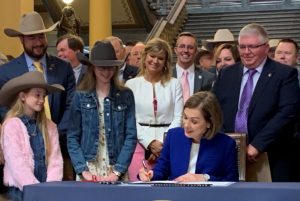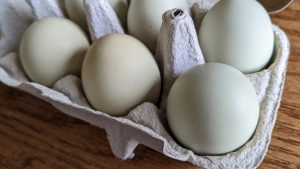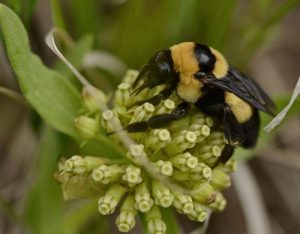CLICK HERE for the latest market quotes from the Iowa Agribusiness Network!
CLICK HERE for the latest market quotes from the Brownfield Ag News Network!
CLICK HERE for the latest market quotes from the Iowa Agribusiness Network!
CLICK HERE for the latest market quotes from the Brownfield Ag News Network!
DES MOINES – The Iowa Department of Natural Resources annual spring auction is being held online until April 24. To view the firearms for sale and to register to bid, go to https://auctionsolutionsinc.com/auctions.
Items up for auction include firearms, bows, gun cases and scopes. The items are sold “as is” with no guarantee or warranty. The list of items for sale and the terms of service is available at https://www.proxibid.com/Auction-Solutions-Inc/Iowa-State-Firearm-Auction-2024/event-catalog/259840.
Iowans who are winning bidders are required to pick up their firearms on April 27, from 10 a.m. to 2 p.m., at the northwest corner parking lot/loading dock of the Wallace State Office Building, 502 East Ninth Street, in Des Moines.
The Iowa DNR reserves the right to reject any bids and withdraw any item from the sale at any time.
(Radio Iowa) – Iowa agriculture officials are closely monitoring new developments with highly pathogenic avian influenza in the country. The U-S-D-A reported dairy cattle in Texas and Kansas tested positive for the virus last month. Earlier, avian flu was confined to domestic poultry and other bird species. Iowa Ag Secretary Mike Naig says other confirmed cases have been reported in Idaho, MIchigan and Ohio.
“What happens is, you’ve got cows that start to go off feed,” Naig says. “They might run a fever, their milk production drops, and that’s how folks started to realize and pick up that they had a problem. So, that certainly affects the health of dairy herds and the profitability of dairy, but, the good news is, those dairy cattle recover, just like you and I get over the flu.”
Last weekend, the Centers for Disease Control issued a health alert to inform clinicians, state health departments and the public of a case of avian influenza in a person who had contact with dairy cows presumed to be infected with the virus. Though the case was confirmed in a farm worker in Texas, Naig says the public should not be alarmed.
“There’s only ever been two confirmed cases of high path avian influenza in humans,” he says. “One was in Colorado a few years ago, related to a poultry site. And, the second one now is a dairy worker, a worker at one of these positive sites who had a lot of contact with those cattle and milk. So you can understand why that might have happened, but there is no indication that it moves from person to person.” Naig adds, the avian flu doesn’t constitute a food safety issue.
“As long as you are drinking pasteurized milk,” Naig says, “the milk that you and I buy at the grocery store, or that kids are drinking at school during a lunch hour, that is pasteurized. That kills any viruses and bacteria that are of concern, that’s where I can say this is not a food safety issue, but one that we are watching very closely, trying to anticipate how we can stay ahead of it here in the state of Iowa.”
More information regarding avian influenza is available on the Iowa Department of Agriculture and Land Stewardship’s website.
(Radio Iowa) – Governor Kim Reynolds has signed a bill into law that gives Iowa’s attorney general subpoena power to investigate agland purchases and ensure foreigners and foreign governments are not investing in Iowa farmland. “Important legislation to secure Iowa farmland from adversaries of the United States,” Reynolds said this morning.
For decades it has been illegal for a foreign citizen for own more than 320 acres of Iowa farm ground, but Reynolds says foreigners could be using a loophole by investing in limited liability companies that buy agland. The new law requires agland purchase reports filed with the state to include more information about ownership structures. “When Iowa speaks, the country listens and with this bill our message is unmistakable: American soil belongs in American hands,” Reynolds said.
Under current law, foreign entities caught owning more than 320 acres of Iowa farmland can be fined $2000. The new law raises that fine to 25% of the assessed value of the land. “Together, these policies ensure that Iowa can continue to deter hostile nations from attempting to undermine or co-opt the agricultural dominance that Iowa farm families have worked so
hard to build,” Reynolds said.

Governor Kim Reynolds signed SF2204 into law in ceremony in Iowa Capitol rotunda on April 9, 2024. (RI photo)
A huge crowd of legislators and ag group leaders gathered in the Iowa Capitol rotunda for today’s bill signing ceremony. Iowa Attorney General Brenna Bird said Iowa has had a good law since 1979 to ban foreign ownership of large tracts of Iowa farmland and this update makes it better.
“We know how important it is to protect our farm ground here in Iowa and I really appreciate the governor and the legislature for giving our office the tools that we need to get to the bottom of a situation if we think a foreign government might own some farm ground,” Bird said. “Call our office. We’ll investigate it and we appreciate the tools that we need to make sure that everybody is following the law.”
Iowa Agriculture Secretary Mike Naig said it’s landmark legislation to keep farm ground in the hands of Iowans. “With strengthened enforcement, deterrence and disclosure tools being implemented with this legislation, Iowa’s prohibition on foreign ownership of farm ground will continue to be the gold standard for this type of legislation in other states,” Naig said.
National estimates indicate foreigners own millions of acres of farmland, roughly equal to the size of Ohio.
(Radio Iowa) – D-N-R staff are now going out after dark and driving back roads to conduct surveys of wildlife. State deer biologist, Jace Elliott, says it’s something they do every spring. “Every county has two different 25 mile transects that run from east to west across each county. And these routes are surveyed at night with a spotlight,” he says. Elliott says they are looking primarily for deer and raccoons, but also other furbearers, like skunks. to track their population.
“And and of course, that’s important because we need to understand the dynamics at play with the different species that we’re monitoring,” Elliott says. “So, for instance, the deer counts that the survey provides, then go into informing our management decisions for antlerless harvest quotas.” He says the numbers will help him learn about some of the impacts on the deer herd. “I’m personally going to be taking a close look at some of our southern Iowa counties in terms of their deer numbers, after the recent E-H-D outbreak may have impacted some county populations in the southern half of the state,” Elliott says. He says the same applies for those keeping an eye on other animals. “All of the furbearers species get examined for statewide and regional trends, but there hasn’t been any large swings in populations from a statewide scale for those species,” he says.
Elliott says the spotlight surveys will run through this month and the results will be released in early summer.
(Radio Iowa) – Iowa State University dedicated the first phase of the new Veterinary Diagnostic Laboratory (VDL) and celebrated the start of construction on the second phase in a ceremony Thursday. The Dean of the College of Veterinary Medicine, Dan Grooms, talked about the importance of the diagnostic lab which first opened in 1947. “Hands down the Iowa State University’s diagnostic lab is recognized globally as a leader in veterinary diagnostic medicine, especially in support of animal agriculture, but also in the support of companion animal health, wildlife health, as well as public health,” Grooms says.
He says examples of that work are diagnosing COVID-19 during the pandemic, and helping the poultry industry when highly pathogenic avian influenza re-emerged this past year “More importantly their work allowed operations to demonstrate that they were free of the disease so that they could continue to move their products,” he says. Grooms says they’ve responded to the latest outbreak impact cattle. “Highly pathogenic avian influenza has emerged as a potential pathogen in the dairy cattle industry, and I am proud to say that is the people in this laboratory in this College of Veterinary Medicine are at the tip of the spear. Where did we hear that? At the tip of the spear in identifying and understanding this emerging disease threat to animal agriculture,” Grooms says.
He says the lab is also the hub of innovation in animal diagnostic medicine. “Whether it’s developing new diagnostic tests or diagnostic strategy, providing real time surveillance data to monitor disease spread across the state or across the country, or discovering novel pathogens, what separates this diagnostic lab from the most for most others, is the discovery that occurs in parallel to the day to day work,” Groom says.
The construction of the first phase started in March 2021 and it began operating last month. Phase Two construction is scheduled to begin this spring with a projected completion date of 2026. The 141 million dollar project includes state and federal funding along with funding from donors and Iowa State University.
JOHNSTON, Iowa [WOI-TV] — Since January, Iowa Bird Rehabilitation (IBR) says dozens of trumpeter swans have died from lead poisoning. IBR, a nonprofit organization that steps in to rescue, rehabilitate and release wild birds back into the wild, takes in around 2,000 birds yearly. On average, only one or two are trumpeter swans. But over the past few months, the nonprofit has admitted 11 swans into their care. Iowans send tips to IBR of birds they notice may be ill or injured, so the nonprofit can monitor, rescue and bring the birds into their care.
There’s not a clear answer where the lead poisoning these trumpeter swans — and other bird species — has come from, but IBR said some causes could be fishing tackle or leftover fragments of lead shot from waterfowl hunting (before using lead was banned in the late ’80s).
And with the drought that a majority of the state of Iowa is facing right now, receding water levels mean trumpeter swans, with those long necks of theirs, can accidentally consume lead fragments at the bottom of lakes and rivers more easily.
To help omit lead introduction to bodies of water, IBR suggests using lead-free tackle when fishing and lead-free ammunition while hunting. The nonprofit also recommends anyone who sees a bird needing help or exhibiting abnormal behavior to contact them.
(Radio Iowa) – Iowa’s turkey hunting season opens this weekend and it’s estimated up to 35-thousand hunters will participate this year. Nate Carr, an Iowa D-N-R conservation officer for Hardin and Hamilton counties, says the agency’s surveys are showing a healthy population of wild turkeys. “It’s looking like a fairly promising year,” Carr says. “We’ve had three straight years of good hatches, pretty good spring weather, so that’s led to stronger numbers. I think we’re looking at comparable harvests to last year, hopefully, a little bit of an uptick is always good to see.”
The first turkey season runs today (Friday) through Sunday and is for Iowa youth only. The first of the four regular seasons opens Monday and they’ll run through May 12th. “Some things hunters want to make sure they’ve got in their pocket before they go, there’s of course their hunting license, and habitat fee,” Carr says. “So, hunting license if you’re 16 and older is required, habitat for you if you’re ages 16 to 64, and then a valid tag for the season that you’re hunting.”
Carr reminds you, there is a bag limit. “Each hunter can get up to two tags with at least one being for season four,” Carr says. “Shooting hours for turkey is a half hour before sunrise to sunset, so traditionally, hunters get out there well before sunrise to get in with the turkeys before they start gobbling.”
There was a free-for-all on Iowa turkeys in the early 1900s, and between hunting and drastic reductions in habitat, the big birds eventually disappeared from Iowa’s woodlands and forests. Wild turkeys were reintroduced in 1966 and have since expanded their numbers across the entire state. Learn more at www.iowadnr.gov.
(Des Moines, Iowa [Iowa Capital Dispatch]) – The Iowa Senate, Wednesday, reconfirmed the director of the state Department of Natural Resources, despite concerns from some Democrats that she is forced to operate as a puppet of Gov. Kim Reynolds. “Kayla Lyon is just like many of Gov. Reynolds’ other appointees and department heads — she can only do so much,” said Sen. Claire Celsi, D-West Des Moines. “She can only do what the boss tells her to do.”
Lyon, 39, of Ames, was appointed to the post by Reynolds in 2019. Her reconfirmation by the Senate this week was prompted by state law, which requires another confirmation vote for appointees after four years. She leads a department of about 890 full-time and 450 seasonal employees. It is charged with maintaining public areas and wildlife and the enforcement of environmental regulations on businesses, cities, drinking water utilities and livestock operations.
A recent DNR evaluation listed more than 700 water body segments in the state that are impaired, meaning they don’t meet water quality standards for recreation, public water supplies and the protection of aquatic life. A primary contributor to the problem is agriculture, which is also under the purview of the Iowa Department of Agriculture and Land Stewardship. State parks also need about $100 million in repairs, and there is a plan to eliminate all park ranger positions, according to the Cedar Rapids Gazette.

Iowa Department of Natural Resources Director Kayla Lyon, left, addresses a joint meeting of the Natural Resource Commission and the Environmental Protection Commission Jan. 22, 2020 at the Wallace State Office Building. (Photo by Perry Beeman/Iowa Capital Dispatch)
Lyon was a lobbyist for dairy farmers and farmers’ cooperatives before joining state government. Her reconfirmation required two-thirds support, and Lyon cleared that threshold with a 40-9 vote. All of those who voted against confirmation were Democrats, and they were just over half of the Democrats in the chamber.
The DNR’s funding requests have been roughly static in recent years. Sen. Tom Shipley, R-Nodaway, disputed that the DNR is prevented from taking sufficient action to protect the environment, along with Democrats’ claims of “how bad our environment is.” He said the resurgence of certain animal populations, such as bald eagles and whitetail deer, is evidence that conditions are improving. “We have otters in the river we never used to have,” Shipley said. “We have turkeys in the trees that we never used to have. We have all kinds of bobcats.”
Lyon did not address the Democrats’ allegations but told Iowa Capital Dispatch: “It’s been an honor to serve as the director of the Department of Natural Resources. I’m grateful for the opportunity to work alongside DNR staff across the state, and I’m humbled by their extensive knowledge and passion. My appreciation for this job doesn’t stop at the office or in the field with staff; it extends to when I’m spending time enjoying the resources with my family.”
(Des Moines, Iowa via the Iowa Capital Dispatch) – The Iowa House passed a bill Wednesday that would prohibit imitation meat products from being misleadingly labeled as meat — with an amendment prohibiting people from purchasing egg substitutes through food assistance programs. Senate File 2391, approved by a 60-34 vote, establishes fines for businesses that create non-meat products and label them with terms used for butchered meat, if the labels do not also include terms like “fake” or “vegetarian” specifying that they are not traditional meat products.
The bill, largely targeting substitute meat products that are made from insects, lab-grown meat and plants, was approved unanimously by the Senate, but was met with strong resistance during House floor debate Wednesday.
Democrats’ opposition to the bill was not over the labeling of products, lawmakers said, but with a House amendment adding restrictions related to eggs and egg substitutes. In addition to adding labeling requirements and establishing fines for misbranding of “fabricated egg products” as eggs, the amendment also created purchasing restrictions on such products. Iowans could not use food benefits through the Supplemental Nutrition Assistance Program (SNAP) or Special Supplemental Nutrition Program for Women, Infants, and Children (WIC) to purchase egg substitutes.
If egg substitutes are approved as purchasable foods through SNAP or WIC, the legislation would direct the Iowa Department of Health and Human Services to seek a waiver or exemption from having these products be eligible for purchase through the programs in Iowa.

(Photo by Jared Strong/Iowa Capital Dispatch)
Rep. Monica Kurth, D-Davenport, said the amended legislation would take away the rights of people on SNAP and WIC to buy foods that they are currently able to purchase through the program — many of whom, she said, use egg substitutes due to allergies or other health concerns. She said egg allergies among children are “not uncommon,” and that egg substitutes are often the only available means to replace them. The bill’s floor manager Rep. Heather Hora, R-Washington, said the amendment came as the bill was meant to protect Iowa’s livestock producers, and that House lawmakers “felt it would be important to protect Iowa’s egg producers as well.”
Rep. Ako Abdul-Samad, D-Des Moines, said he believed proper food labeling was “imperative,” but he could not support a measure that would specifically restrict people in need of food assistance from purchasing products they need based on medical or dietary restrictions.
In her closing comments, Hora said she understands the concerns about food access, but that the SNAP and WIC restrictions are related to labeling these products as related to eggs. The bill goes back to the Senate for consideration of the amendment.

Xerces Society photo